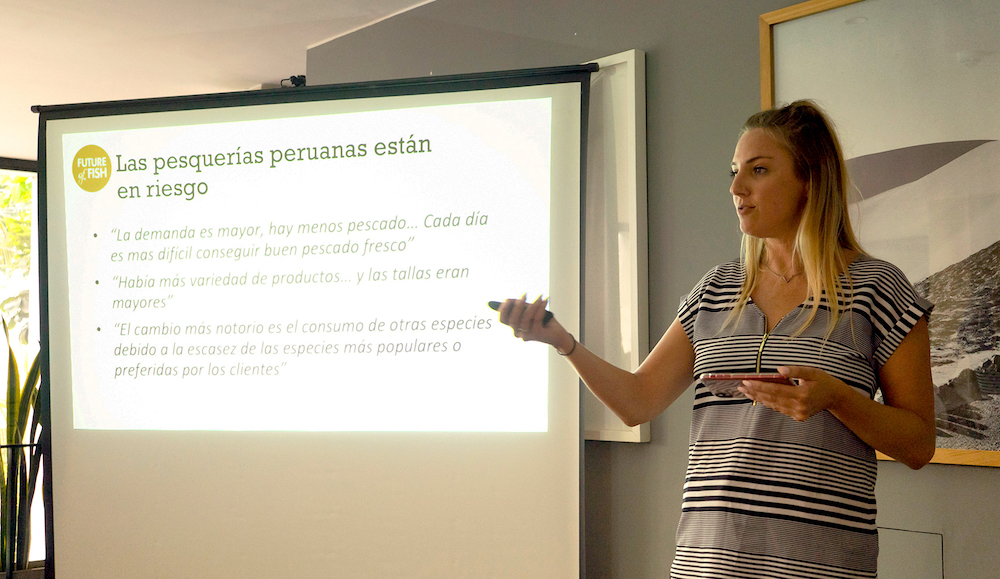
No one person or organization can change a system. Improving seafood sourcing, shifting supply chains, and strengthening small-scale fisheries all require massive and long-term efforts from multiple stakeholders and passionate advocates. Still, every system has intervention points or key levers that can help accelerate change. As we try to build a movement for responsible seafood sourcing in Peru, we’ve identified chefs as powerful levers for driving the movement.
Responsible seafood sourcing is still emerging as a concept in Peru. In some other countries, responsible sourcing has been incentivized either by public call-outs of bad actors or by incentives to use sustainable sourcing to access new markets. In Peru, these positive and negative incentives don’t yet exist in the same way. That’s what makes chefs so important: the gastronomic sector has a key role to play both in the way ingredients are sourced, and through the messages shared with the public. Chefs are at the heart of Peru’s reputation as a seafood-driven culinary destination, and getting them excited about responsible sourcing can be a shortcut to popularizing the idea more widely and generating a national movement. This is vital, especially as the need for responsible use of our marine resources becomes increasingly critical.
That’s why we’ve joined forces with the Peruvian Society of Environmental Law (SPDA) to participate in their “Pact for Responsible Fisheries” campaign, convened by Conservamos por Naturaleza, an initiative of SPDA. Our project to create a responsible seafood sourcing guide supports this campaign by inviting supply chain actors to dig in and help define criteria and best practices for enabling improvements that support preservation of marine resources for future generations. We’re joined by Oceana, whose research on seafood mislabeling provides a vital grounding of the need for, and potential value of, accurate labeling and responsible sourcing. Collaborating closely with these organizations lets us combine forces as we work toward a common goal.
On February 25, our Peru Program Manager, Gretchen Thuesen, contributed to a “responsible fisheries 101” discussion with a group of chefs and restaurateurs who gathered as part of this campaign. The meeting began with an introduction to the current state of fisheries in Peru, presented by Bruno Monteferri of SPDA, and a primer on mislabeling in Peruvian seafood supply chains from Juan Carlos Riveros of Oceana. This was followed by Gretchen’s overview of Future of Fish’s research on responsible sourcing around the world and how it might apply to the Peruvian context. While Peru is unique due to the makeup of its fisheries, markets, and specific culinary legacy, there’s a lot to be learned from other countries — in fact, many face similar challenges, and the various models and strategies developed around the world can provide valuable learnings when implementing sustainability in Peru.
Gretchen also took the opportunity to present some of the findings from our recently-conducted seafood market survey, which evaluated Peru’s current seafood market demand by collecting information on restaurant and consumer seafood consumption patterns, purchasing preferences, and knowledge about responsible fishing. It also allowed us to compare and contrast what we found in Peru with what’s happening in other countries. A short report of the key findings from this survey is being produced, and will be shared in the coming weeks.
Next, we’ll be working with partners and supply chain actors to start building momentum for this guide. We’ll engage and rely on local experts to help shape next steps and make sure our plan for the seafood guide matches what is wanted and needed. We will be building a working group and holding a series of meetings to define and agree on responsible sourcing criteria, before finalizing the guide.
Peru’s chefs — world-leading, influential, and eager to innovate — can help lead the push towards more responsible seafood sourcing in Peru’s small-scale fisheries. We’re excited for the next steps, and to continue collaborating with local actors across the country.
Published Mar 26, 2020




